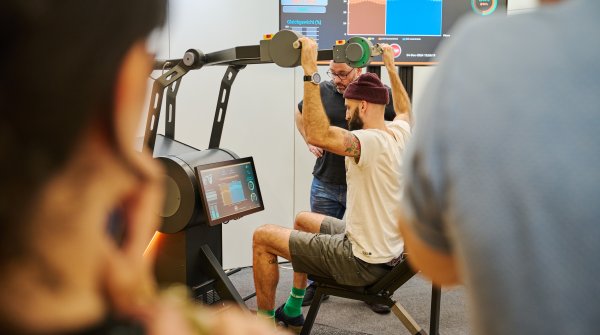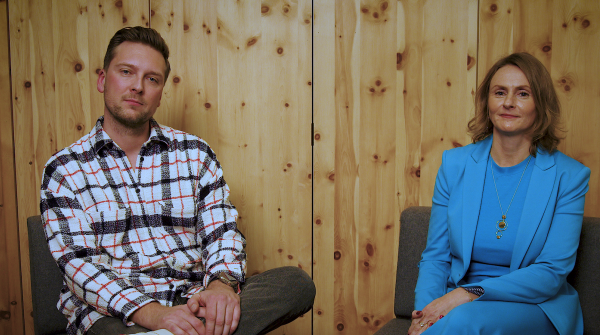
The good news for companies that motivate their employees to exercise regularly comes from Australia: according to a recent study, just 15 to 20 minutes of intensive physical activity per week reduces recent study reduces the risk of serious illness and lowers the mortality risk by up to 40 percent.
The only important thing is that each workout lasts about two minutes and is so intense that talking is impossible. So ideal for a short lunchtime session on the roller trainer like Ryzon's, a little workout with the LesMills app, or a sprint to the bus
Patagonia introduced flextime back in the 1980s. Founder Yvon Chouinard writes about this in his book "let my people go surfing": "Daily work must be bearable. We all have to continue to come to work upbeat and walk up the stairs two steps at a time." And further, "We all had to have flex time to surf the waves when they were good, or ski on powder after a big snowstorm."
According to the company, Patagonia is committed to flexibility, which is a benefit for employees and has an impact on the quality of life and work, and thus naturally on the motivation and satisfaction of colleagues. That's why the motto is: "Go with the flow": "We leave room for maneuver - that's motivating, fun and the positive energy comes all by itself.
Being able to flexibly manage working hours in order to have time for sports: The Cologne-based company Ryzon lives New Work with the Corporate Fitness module. "Doing sports is not only tolerated during working hours, it is encouraged. Getting a clear head and being able to get back to work fresh after sports helps efficiency," says Felix Erdmann, People and Culture Manager at Ryzon.
Whether it's unpaid leave for fun outdoor activities, as at U.S. outdoor equipment manufacturer REI, or paid ski passes, as is the norm at snowboard manufacturer Burton, unusual, health-promoting benefits are climbing up the wish list of Generation Z applicants. They are replacing classic benefits such as meal vouchers and company cars.
In times when qualified applicants are becoming scarcer, it is worthwhile for companies to advertise sporting benefits. For the startup unicorn Personio, "it is particularly important that we offer our employees something that creates added value and contributes to their health and well-being," says Culture & Community Manager Nina Rogler. That's why the software company regularly reviews its benefit offerings, taking internal feedback into account, she says. "With the benefits we offer, we want to address the right target group and appear as an attractive employer on the market. So our benefits are also used for employer branding."
For sports companies, however, athletic benefits also mean that people with the right mindset apply - and LesMills isn't the only one who sees it that way: "Our benefits as well as our corporate values lead to people applying to us who have the right mindset and are interested in a healthy and active lifestyle." People and Culture Manager Erdmann also confirms this: "Our applicants are happy about the flexibility and the opportunity to play sports."

Previous studies in the U.S., such as the large-scale Rand study (sponsored by the U.S. government) in 2013: The effects of corporate fitness on employee* health are enormous. The fact that wellness programs increase productivity, reduce stress, and improve employee engagement and communication is also confirmed in Research by German psychologist Prof. Sabine Sonnentag.
Similar reports Forbes and refers to a study by the Harvard Business School. The study found that for every dollar spent on wellness programs, U.S. companies cut medical expenses by $3.27 and employee absenteeism by $2.73.
From past studies, Hannah Clauß of LesMills knows "how important it is to exercise and what effect fitness, and especially group fitness, has on people's health as well as motivation." A recent study also showed that "we train harder when we exercise in a group. With the offer and the flexibility to be active anytime and anywhere, we ensure on the one hand that our employees stay fit and on the other hand we enable them to have fun and experience high emotions while doing sports together. This strengthens team cohesion and noticeably boosts motivation."

Stronger in the team - Nina Rogler from Personio also confirms this effect: "We established our health weeks during Corona, for example; here, too, we were able to determine a positive influence on team strength and team cohesion." This is the result of surveys among employees.
Clothing manufacturer Ryzon not only runs an Urban Sports Club sponsorship for its employees*, but at its headquarters there are two roller trainers including a company login to Zwift. According to Erdmann, joint bike rides are completed as well as runs. "Bouldering, paddle tennis or badminton are also tackled from time to time."

Personio offers its employees in Germany, Spain, England and the Netherlands a wide range of activities - including subsidies for gym membership (e.g. Qualitrain for Germany or Gympass for other locations). In addition to yoga classes, there is a Mental Health Service. Depending on the office location, this includes three months of coaching or an eight-hour workshop. Once a year, the company organizes so-called Health Weeks with different focuses - from physical and emotional to financial health.
Access to fitness in all markets - that is one of the sporting benefits at New Zealand fitness provider LesMills; either through a gym membership or other agreements with fitness facilities. In New Zealand, for example, employees* can use all studios free of charge, while employees in Germany (where there are no pure LesMills studios) have access to a network of gyms. In addition, all employees worldwide have access to the company's fitness app and can save on the purchase of smart tech equipment.

"let my people go surfing" - the title of founder Yvon Chouinard's book has applied to the Patagonia team since the very beginning. In other words, on a good surfing day, everyone divides up their own time whenever possible. Work must be done "naturally," however, there is room for time slots that can be used responsibly, the company explains. "This guiding principle applies to all (sports) activities that enrich our lives. We've found that self-determination and the flexible use of time windows for personal interests are really valuable for our employees." In addition, employees* would join forces of their own accord to go running, cycling or surfing together. In the office in Amsterdam, for example, it came about quite naturally to do sports together.
The amount of time employees can spend exercising during working hours varies widely. "Everyone can do sports whenever they want. We don't focus on working hours. For us, it's about the outcome," says Ryzon manager Erdmann.
In general, the time during which employees can participate in sports supported by their company is not working time. Nevertheless, many companies allow employees to participate in sports during working hours. This is because the companies focus on self-responsibility: "Time is precious and that's why we make it as easy as possible for our employees to integrate sports and exercise into their daily routine. By creating the freedom to do a workout during the day and encouraging active lunch breaks, for example, we lay the foundation for our team to feel healthy and well" - this is the strategy of LesMills.
For the future, the "European Health & Fitness Market Report 2022": "Corporate fitness shows potential that needs to be tapped." The representative study "Fitness 2022" by pronova BKK paints a similar picture. During the Corona pandemic, German employees* developed great interest in company online sports offerings. 41 percent would like to use comparable offers from their employer or already do so. In the case of online workouts during the lunch break, this applies to 32 percent.

The situation is similar in Spain, for example. Borja Sañudo Corrales and Jerónimo García-Fernández from the University of Seville describe the situation regarding company fitness as follows: Up to 34 percent of employees worked in home offices during the lockdowns, and 30 percent still work remotely now. The Spaniards' conclusion: corporate wellness programs must adapt to the new reality - for example, with fitness apps and other social media tools.
- Awards
- Mountain sports
- Bike
- Fitness
- Health
- ISPO Munich
- Running
- Brands
- Sustainability
- Olympia
- OutDoor
- Promotion
- Sports Business
- Textrends
- Triathlon
- Water sports
- Winter sports
- eSports
- SportsTech
- OutDoor by ISPO
- Heroes
- Transformation
- Sport Fashion
- Urban Culture
- Challenges of a CEO
- Trade fairs
- Sports
- Find the Balance
- Product reviews
- Newsletter Exclusive Area
- Magazine





